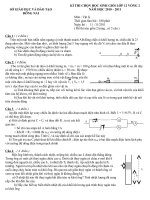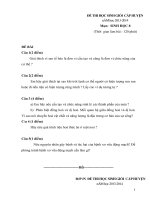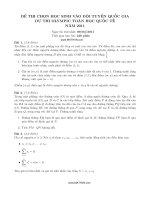DE THI CHỌN HỌC SINH GIỎI TIẾNG ANH VÒNG HUYỆN
Bạn đang xem bản rút gọn của tài liệu. Xem và tải ngay bản đầy đủ của tài liệu tại đây (235.5 KB, 11 trang )
UBND HUYN HA BNH
(Đ gm 5 trang)
!
"#$%
&'#(
)*+,+ #/0)12
(Không k thi gian giao đ)
3
-42#&56!078
. &+729.2:2)979;:.<947-2+:.7 =>-4?6√)2)9;:449;2 7@942:2)9> A7
BC972+:.D)9E+472:.9+7=:.9E:4F:C-7 9G->0H9D6078
I)-2J7-4-)J7E-<:4+2970:42K
A B C
D L
D When is John’s party?
A B C D
D What time does the concert begin?
A B C D
D How much did Emma’s new coat cost?
£20 £25 £30 £35
A B C D
!D What’s Jimmy’s favorite animal?
A B C D
. &+729.2:2)9;:.<947-2+:. =;)::792)9M972:02+:.6%NON:482:
7@949-;)BC972+:.D6078
D Where does William Anthony Barker come from?
A. New Zealand B. England C. Australia D. The USA
DWhat does he do?
1
A. worker B. musician C. mechanic D. doctor
DWhat is he doing in London?
A. He is on business B. He is on holiday
C. He is working there D. He is meeting his relatives
!DWhat’s his telephone number?
A. 020 7545 3555 B. 020 7535 3355
C. 020 7535 3555 D. 020 7545 3355
-42#&%%5P6Q078
D)::792)9M972:02+:.6%NON:482:;:>0H9299-;):E2)9E:HH:@+.,
79.29.;9D6078
D My brother prefers playing soccer ……………… listening to music.
A. as B. so C. than D. to
D No cars are …………………. in the city center.
A. allowed B. allowing C. allows D. to allow
D I……………… her since we were children.
A. know B. knew C. did know D. have known
!D The exercises are………………difficult for us to do.
A. from B. more C. too D. to
/D We look forward………………you soon.
A. see B. seeing C. to see D. to seeing
QD How much time do you spend……………TV everyday?
A. on watching B. watching C. to watch D. watch
7. Tom can speak two languages. One is English. is French.
A. Other B. Another C. The other D. Others
R. In the summer my brother always wears shirts with short …………
A. hands B. arms C. sleeves D. shoulders
(. The children kept ………… about the clowns that they liked most of all.
A. talking B. talked C. to talk D. talk
. I’ll give her the message as soon as she …… tomorrow.
A. comes back B. will come C. is coming D. has come
DS9-= =;)::792)9M972 7@942:;:>0H9292)90-77-,9D6078
An important part of world history is the story of communication. In
prehistoric times, (1) ________ example, people did not have books. They did not
(2) ________much about geography. People were (3) ________. They knew only
about themselves and their (4) ________ (the land around their homes). Their
knowledge of geographical things like mountains and rivers was limited. They did
not travel very far. Sometimes they knew about nearby people and (5) ________
with them. They sent (6) ________in simple ways. Early signals for communication
included smoke from fires and the sounds of drums.
2
Then people formed towns, and then cities, as safe places to live. Soon they
began to (7) ________other ways to communicate, to spread information. People
began to buy and sell things to (8) _________. Because of their business, they
developed writing systems to keep records and to send messages. Life was changing
for many people. Business caused changes, and so (9) _________ the invention of
the printing press. Many more people learned to read then.
Suddenly communication and knowledge improved (10) ________. People
sent letters and news by horse and carriage. Later the mail went by train and then by
airplane. World communication was now a possibility.
1. A. for B. an C. at D. in
2. A. get B. see C. know D. have
3. A. limited B. limit C. limiting D. be limited
4. A. friends B. houses C. homes D. environment
5. A. communicate B. communicated C. community D. communicating
6. A. letters B. messages C. gifts D. words
7. A. hold B. buy C. develop D. help
8. A. them B. each other C. one another D. others
9. A. as B. do C. was D. did
10. A. greatly B. bad C. great D. badly
. S9@4+292)9E:HH:@+.,79.29.;97@+2):C2;) ,+.,>9 +.,D6078
. The question is so difficult that we can’t answer it.
-> It’s ………………………………………………………………………
. The meeting lasted two hours.
-> It was ……………………………………………………………………
. I like listening to music more than watching television.
-> I prefer ………………………………………………………………….
!. No one could do these exercises correctly.
-> These
/. We started living here fifteen years ago.
-> We have
Q. My friends are good soccer players.
-> My friends play
T. I can’t write to you because I don’t know your address.
-> If……………………………………………………………………….…
R. The last time we met our teacher was five years ago.
-> It’s
(D No one in the class is better than her.
-> She is
. We spent two hours doing the homework.
-> It took
3
-42#S5%6/078
DS9-= =E+HH+.2)9,-072:;:>0H9292)9H92294D6078
Dear Maria,
At last! We finished all our exams yesterday. The last one was History. It was
horrible. I think (1) __________ is really difficult because I can't (2) __________ all
the facts and the (3) __________. I did seven (4) __________. The worst were
Science and History. I found (5) __________ very difficult. I always (6) __________
most of the things we've learned. The best subject this year was Geography, (7)
__________ we only had it twice a week.
We're (8) __________ to Wales in the middle of August to see my
granddad. (9) __________ you like to come with us? Mum says it's OK.
Please write and tell me about your year at school. What was it (10)
__________? Were your exams easy?
Bye for now.
Peter.
DS9-=+.,2-7?7D6078
D-7?#S9-=2)90-77-,9N2)9.;)::792)9M972:02+:.6%NON:482:
;:>0H9299-;)79.29.;9D608
After inventing dynamite, Swedish-born Alfred Nobel became a very rich
man. However, he foresaw its universally destructive powers too late. Nobel
preferred not to be remembered as the inventor of dynamite, so in 1895, just two
weeks before his death, he created a fund to be used for awarding frizzes to people
who had made worthwhile contributions to mankind. Originally there were five
awards: literature, physics, chemistry, medicine and peace. Economics was added in
1968, just sixty – seven years after the first award ceremony.
Nobel’s original legacy of nine million dollar was invested, and the interest on
this sum is used for the awards which vary from 30,000 dollars to 125,000 dollars.
Every year on December 10, the anniversary of Nobel’s death, the awards
(gold medal, illuminated diploma and money) are presented to the winners.
Sometimes politics plays an important role in the judges’ decisions. Americans have
won numerous science awards, but relatively few literature prizes.
No awards were presented from 1940 to 1942 at the beginning of World War
II. Some people have won two prizes, but this is rare: others have shared their prizes.
. When did the first award ceremony take place?
A. 1895 B. 1901 C. 1962 D. 1968
. Why was the Nobel prize established?
A. to recognize worthwhile contributions to humanity.
B. to resolve political differences.
C. to honor the inventor of dynamite.
4
D. to spend money.
. In which field have Americans received the most awards?
A. literature B. peace C. economics D. science
!. Which of the following statements is not true?
A. Awards vary in monetary.
B. Ceremonies are held on December 10 to commemorate Nobel’s invention.
C. Politics can play an important role in selecting the winners.
D. A few individuals have won two awards.
D-7?#S9-=2)90-77-,9N2)9. 7@942)9BC972+:.7M9H:@D608
Elizabeth Blackwell was born in England in 1821 and emigrated to New York
City when she was ten years old. One day she decided that she wanted to become a
doctor that was nearly impossible for a woman in the middle of the nineteenth
century. After writing many letters seeking admission to medical schools, she was
finally accepted by a doctor in Philadelphia. So determined was she that she taught
school and gave music lessons to earn money for her tuition.
In 1849, after graduation from medical school, she decided to further her
education in Paris. She wanted to be a surgeon, but a serious eye infection forced her
to abandon the idea.
Upon returning to the United States, she found it difficult to start her own
practice because she was a woman. By 1857 Elizabeth and her sister, also a doctor,
along with another female doctor, managed to open a new hospital, the first for
women and children. Besides being the first female physician in the United States
and founding her own hospital, she also established the first medical school for
women.
*Questions:
. Why did Elizabeth Blackwell have to abandon her dream of becoming a surgeon?
. How old was Elizabeth Blackwell when she graduated from medical school?
. Did Elizabeth Blackwell overcome serious obstacles to become the first woman
doctor in the United states?
!. Who founded the first hospital for women and children?
-42!#IS6078
Write a paragraph from 120 to 150 words:
Most of the students use mobile phone. Write a paragraph about the
advantages and disadvantages of using mobile phone of students
THE END
5
UBND HUYN HA BNH
(Hướng dẫn chấm gm 2 trang)
!
"#$%
&'#(
U'VW
-42#&56!078
D6078D5-;);:449;2 7@94,927N/0:+.2D
1. D 2. C 3. B 4. D
D6078D5-;);:449;2 7@94,927N/0:+.2D
1. A 2. B 3. B 4. C
-42#&%%5P6Q078
D6078D5-;);:449;2 7@94,927N0:+.2D
1. D 2. A 3. D 4. C 5. D
6. B 7. C 8. C 9. A 10. A
D6078D5-;);:449;2 7@94,927N0:+.2.
1. A 2. C 3. A 4. D 5. B
6. B 7. C 8. C 9. D 10. A
D6078D5-;);:449;2 7@94,927N0:+.2D
. It’s such a difficult question that we can’t answer it.
. It was a two-hour meeting.
. I prefer listening to music to watching television.
!. These exercises couldn’t be done correctly.
/. We have lived here for fifteen years
Q. My friends play soccer well.
T. If I knew your address, I could write to you.
R. It’s five years since we last met our teacher.
(. She is the best (student) in her class.
. It took us two hours to do the homework.
-42#S5%6/078
D6078D5-;);:449;2 7@94,927N0:+.2D
1. History 2. remember 3. dates 4. subjects
5. them 6. forget 7. but 8. going
9. Would 10. like
DS9-=+.,2-7?76078D
D608D-7?#5-;);:449;2 7@94,927N/0:+.2D
1. B 2. A 3. C 4. B
D6078D-7?#5-;);:449;2 7@94,927N/0:+.2D
6
1. Because a serious eye infection forced her to abandon dream of becoming a
surgeon.
2. She was 28.
3. Yes, she did.
4. She and several other women/(she and her sister along with another female
doctor) founded the first hospital for women and children.
-42!#I4+2+.,
+X> Y+=C.,N>Z;[Y;\.[]2
2 -> 3
Bố cục rõ; diễn đạt mạch lạc, lô gíc; sử dụng đúng nghữ pháp, từ vựng;
nội dung thể hiện được những tiện ích và tác động tiêu cực của điện
thoại; đảm bảo dung lượng qui định.
1 -> dưới 2
Cũng thể hiện được các nội dung như nêu trên, nhưng chỉ đạt ở mức độ
khá. Có mắc một số sai sót nhỏ không cơ bản trong sử dụng câu, từ.
0 -> dưới 1
Bài viết có thể hiện được một vài ý về tiện ích và tác động tiêu cực của
điện thoại, nhưng sơ sài, dung lượng không đảm bảo.
THE END
7
UBND HUYN HA BNH
!
"#$%(N^_
)*+,+ #0)12`2)a7+.)
(Thi gian chuẩn bị đ tài: 05 phút)
:0+;#
Talk about your close friend and tell why you like her or him.
(:29# You have 5 minutes to prepare and 3 minutes to talk about the topic8
UBND HUYN HA BNH
!
"#$%(N^_
)*+,+ #0)12`2)a7+.)
(Thi gian chuẩn bị đ tài: 05 phút)
:0+;#
Where do you prefer to live, city or the countryside? Why?
(:29# You have 5 minutes to prepare and 3 minutes to talk about the topic8
UBND HUYN HA BNH
!
"#$%(N^_
)*+,+ #0)12`2)a7+.)
(Thi gian chuẩn bị đ tài: 05 phút)
:0+;#
Talk about activities you would do during the visit from a pen pal.
(:29# You have 5 minutes to prepare and 3 minutes to talk about the topic8
8
UBND HUYN HA BNH
!
"#$%(N^_
)*+,+ #0)12`2)a7+.)
(Thi gian chuẩn bị đ tài: 05 phút)
:0+;!#
Shoud students in secondary school wear uniform? Talk about it
(:29# You have 5 minutes to prepare and 3 minutes to talk about the topic8
UBND HUYN HA BNH
!
"#$%(N^_
)*+,+ #0)12`2)a7+.)
(Thi gian chuẩn bị đ tài: 05 phút)
:0+;/#
Name some TV programs that you often watch. Which programs do you like best?
Talk about it.
(:29# You have 5 minutes to prepare and 3 minutes to talk about the topic8
9
U'VW_
+X> Y+=C.,N?b.c.,;\.[]2
1.5 -> 2
- Thể hiện tốt nội dung của chủ đề, sắp xếp bố cục rõ , các ý được trình
bày theo trình tự, lô gíc;
- Phát âm chuẩn, đúng ngữ pháp, ngữ điệu, trình bày lưu loát, tác phong
nhanh nhẹn, tự tin;
- Thể hiện hết nội dung nhưng phải đảm bảo thời lượng qui định.
1 -> dưới 1.5
- Thể hiện được nội dung của chủ đề, sắp xếp bố cục rõ , trình bày dược
các ý cơ bản hợp lý;
- Phát âm đúng, đảm bảo ngữ pháp, từ vựng, trình bày chưa thật lưu
loát, mạnh dạn tự tin;
- Đảm bảo thời lượng qui định.
0 -> dưới 1
- Nêu được một số ý của nội dung chủ đề;
- Còn ngập ngừng, lúng túng trong trình bày, phất âm chưa chuẩn, sử
dụng từ vựng, ngữ pháp chưa đảm bảo;
- Sử dụng thời lương qui định chưa hiệu quả.
10
11
U'V^5
- Phần thi nghe có 2 nội dung (trong đề thi)
- Tổng thời lượng nghe đĩa là 7 phút 04 giây.
- Học sinh được nghe lần lượt từng nội dung, mỗi nội
dung được nghe 2 lượt. Giữa hai nội dung có nhạc
hiệu khoảng 30 giây.
- Trước khi cho học sinh nghe đĩa, giám thi thông báo
cho học sinh và dành khoảng 5-7 phút cho các em
chuẩn bị, đọc tìm hiểu nội dung phần nghe.









